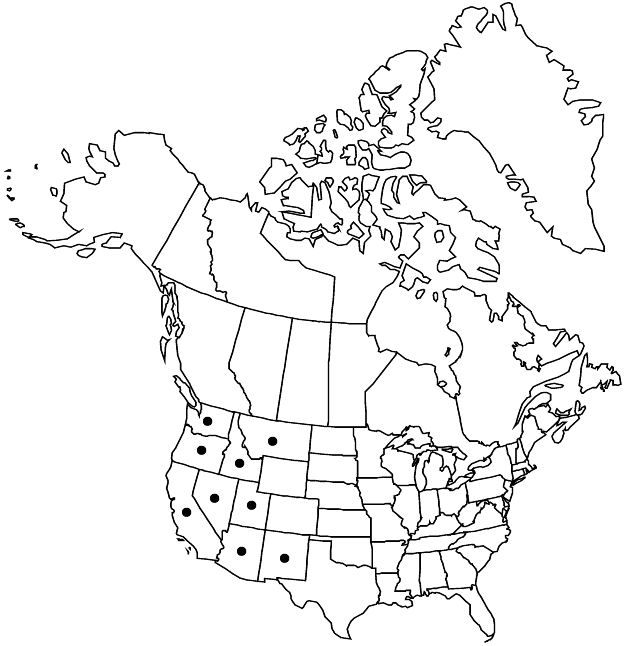Difference between revisions of "Elatine californica"
Proc. Amer. Acad. Arts 13: 361, 364. 1878.
FNA>Volume Importer |
imported>Volume Importer |
||
| (6 intermediate revisions by 2 users not shown) | |||
| Line 12: | Line 12: | ||
|name=Elatine californica var. williamsii | |name=Elatine californica var. williamsii | ||
|authority=(Rydberg) Fassett | |authority=(Rydberg) Fassett | ||
| − | }}{{Treatment/ID/Synonym | + | |rank=variety |
| + | }} {{Treatment/ID/Synonym | ||
|name=E. williamsii | |name=E. williamsii | ||
|authority=Rydberg | |authority=Rydberg | ||
| + | |rank=species | ||
}} | }} | ||
|hierarchy=Elatinaceae;Elatine;Elatine californica | |hierarchy=Elatinaceae;Elatine;Elatine californica | ||
| Line 30: | Line 32: | ||
|elevation=0–1900(–2600) m. | |elevation=0–1900(–2600) m. | ||
|distribution=Ariz.;Calif.;Idaho;Mont.;Nev.;N.Mex.;Oreg.;Utah;Wash.;Mexico (Baja California). | |distribution=Ariz.;Calif.;Idaho;Mont.;Nev.;N.Mex.;Oreg.;Utah;Wash.;Mexico (Baja California). | ||
| − | |discussion=<p>Elatine californica is distinguished from other species of the genus by having long pedicels that are recurved in fruit and strongly curved seeds that can be nearly circular.</p> | + | |discussion=<p><i>Elatine californica</i> is distinguished from other species of the genus by having long pedicels that are recurved in fruit and strongly curved seeds that can be nearly circular.</p> |
|tables= | |tables= | ||
|references= | |references= | ||
| Line 39: | Line 41: | ||
-->{{#Taxon: | -->{{#Taxon: | ||
name=Elatine californica | name=Elatine californica | ||
| − | |||
|authority=A. Gray | |authority=A. Gray | ||
|rank=species | |rank=species | ||
| Line 54: | Line 55: | ||
|publication year=1878 | |publication year=1878 | ||
|special status= | |special status= | ||
| − | |source xml=https:// | + | |source xml=https://bitbucket.org/aafc-mbb/fna-data-curation/src/2e0870ddd59836b60bcf96646a41e87ea5a5943a/coarse_grained_fna_xml/V12/V12_499.xml |
|genus=Elatine | |genus=Elatine | ||
|species=Elatine californica | |species=Elatine californica | ||
Latest revision as of 19:15, 5 November 2020
Herbs, submersed or growing on exposed but wet substrates, 1–5 cm. Stems decumbent to erect, branched. Leaves light green to green, sometimes becoming reddish in terrestrial plants; stipules lanceolate, 0.5–0.6 mm, margins dentate, apex acute; petiole 1–4 mm; blade obovate to oblanceolate, 4–12(–15) × 1.2–3 mm, base narrowly cuneate, apex acute to obtuse. Pedicels 1.5–2.5(–3.5) mm, recurved in fruit. Flowers: sepals 4, usually equal, sometimes 1 reduced, oblong-ovate or widely lanceolate, 0.5–0.6 × 0.3–0.4 mm; petals 4, greenish white, slightly reddish, or pink, elliptic or ovate, 1–1.5 × 0.5–0.6 mm; stamens 8; styles 4. Capsules depressed-ovoid, 4-locular, 1.3–2.5 mm diam. Seeds 2–5 per locule, oblong to ellipsoid, curved 90–180°, 0.6–1 × 0.2 mm; pits elliptic, length 1–3 times width, in 6–10 rows, (16–)20–29 per row.
Phenology: Flowering summer.
Habitat: Pools, pond shores, rice fields, stream banks.
Elevation: 0–1900(–2600) m.
Distribution

Ariz., Calif., Idaho, Mont., Nev., N.Mex., Oreg., Utah, Wash., Mexico (Baja California).
Discussion
Elatine californica is distinguished from other species of the genus by having long pedicels that are recurved in fruit and strongly curved seeds that can be nearly circular.
Selected References
None.